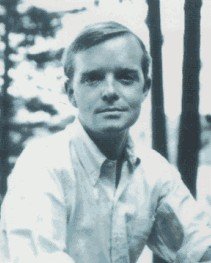| Truman Capote  AKA Truman Streckfus Persons AKA Truman Streckfus Persons
Born: 30-Sep-1924
Birthplace: New Orleans, LA
Died: 25-Aug-1984
Location of death: Los Angeles, CA
Cause of death: Liver Failure
Remains: Buried, Westwood Memorial Park Cemetery, Los Angeles, CA
Gender: Male
Race or Ethnicity: White
Sexual orientation: Gay
Occupation: Novelist Nationality: United States
Executive summary: In Cold Blood Born into a New Orleans family that divorced when he was a young child, Truman Persons was raised by relatives in Monroeville, Alabama. There he became close friends with Harper Lee, later author of To Kill a Mockingbird. His mother remarried and when he was 9, and the family moved to New York City. At 17, he was hired by The New Yorker to do clipping and sorting, and during his two years there he shopped short stories to various magazines.
In 1945, Mademoiselle purchased his story, "Miriam", and it won an O. Henry award, in the First Published category. In 1948 he won that award's first place for "Shut a Final Door" in the Atlantic Monthly, and third place for "The House of Flowers" in 1951, again in Mademoiselle. Bennett Cerf had read "Miriam" and paid Capote a $1500 advance for a novel, Other Voices, Other Rooms, which Random House published in 1948. It was unwittingly semi-autobiographical, and debuted at #9 on the New York Times bestseller list. The photograph of a reclining Capote on the back of the book, taken by Harold Halma, caused considerable comment.
Capote adapted his 1951 novel The Grass Harp to Broadway, but it was not successful. With John Huston, he adapted James Helvick's novel into the 1953 film, Beat the Devil starring Humphrey Bogart. It is a satire, and not a typical Bogart film. In 1954, he and Harold Arlen adapted his short story, House of Flowers, to be a Broadway musical. Capote entered a more mature period with Breakfast at Tiffany's, published as a 1958 novella and made into an exceptional 1961 film, Breakfast at Tiffany's starring Audrey Hepburn and George Peppard.
By the mid 1960s, Capote had become an unparalleled social gadfly, and one of the centers of New York society. In the fall of 1966, he invited 500 guests to a masquerade ball at the Grand Ballroom of the Plaza Hotel. Ostensibly the party was for Washington Post publisher Katharine Graham. Some of those who were not invited had to find creative excuses to be out of town. It was the social event of the year, and the New York Times gave it a full page of coverage, including -- scandalously -- the full list of invitees, secretly provided by Capote.
The proceeding would have granted anyone immortality. But Truman Capote's finest accomplishment is his 1965 novel, In Cold Blood. It is an entirely new kind of novel -- journalism, done as fiction. The novel relates the brutal murders of Herbert Clutter and his family, commited by paroled convicts Dick Hickock and Perry Smith. Capote was so intrigued by the story that he traveled to the scene before the names of the killers were known. He interviewed both Hickock and Smith, who were both later executed. In Cold Blood was published first serially in The New Yorker in 1965, and then as a book the following year. In an interview, Capote described his thinking: Journalism was horizontal, and fiction was vertical. He wanted a mix of the two. The novel was a stunning success. It was adapated into and directed as a film by Richard Brooks, released as In Cold Blood (1967).
Capote was never able to finish what he considered his "masterwork", Answered Prayers. Two portions of it were published in Esquire, but the second part, "La Côte Basque 1965", a roman à clef of William S. Paley, not only alienated Paley, one of Capote's best friends, but publication of this apparent tell-all proved disastrous to certain aspects of his social life. In his latter years, Capote was plagued by previous abuses, including alcohol and narcotics. Hallucinations, seizures, and writer's block lessened his output markedly. He died in 1984 at the Los Angeles home of Johnny Carson's former wife Joanna, from liver failure. Father: Archulus Persons
Mother: Lillie Mae Faulk ("Nina", d. 1954 suicide)
Father: Joseph Garcia Capote (stepfather)
High School: Trinity School, New York City, NY
High School: Greenwich High School, Greenwich, CT
High School: Dwight School (1942)
The New Yorker copy boy
Fair Play for Cuba Committee
Smithers Addiction Treatment Center
Silver Hill Hospital
Driving While Intoxicated 1976
O. Henry Award 1948 for Shut a Final Door
Edgar Allan Poe Award 1962 for The Innocents (best motion picture)
Edgar Allan Poe Award 1966 for In Cold Blood (best fact crime)
Adopted 1935
Tonsillectomy (Oct-1946)
Autopsy
Risk Factors: Tonsillitis, Epilepsy, Cocaine, Alcoholism, Depression
FILMOGRAPHY AS ACTOR
Murder by Death (23-Jun-1976) · Lionel Twain
Cocksucker Blues (1972) · Himself
Trilogy (6-Nov-1969) [VOICE]
Author of books:
Other Voices, Other Rooms (1948, novel)
A Tree of Night and Other Stories (1949, short stories)
Local Color (1950, collection)
The Grass Harp (1951, novel)
The Muses Are Heard (1956, collection)
Breakfast at Tiffany's (1958, collection)
Selected Writings (1963, collection)
In Cold Blood (1965, novel)
A Christmas Memory (1966, fiction)
The Thanksgiving Visitor (1968, fiction)
The Dogs Bark: Public People and Private Places (1973, collection)
Music for Chameleons: New Writing (1980, collection)
Requires Flash 7+ and Javascript.
Do you know something we don't?
Submit a correction or make a comment about this profile
Copyright ©2019 Soylent Communications
|